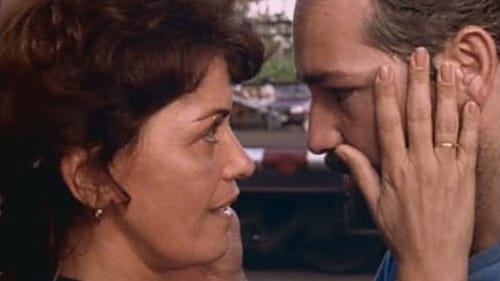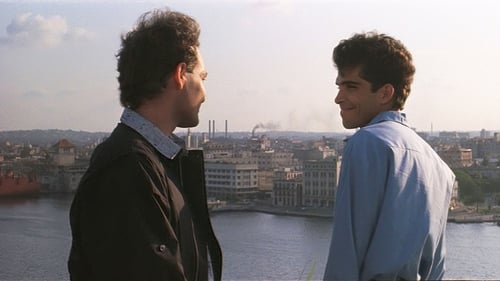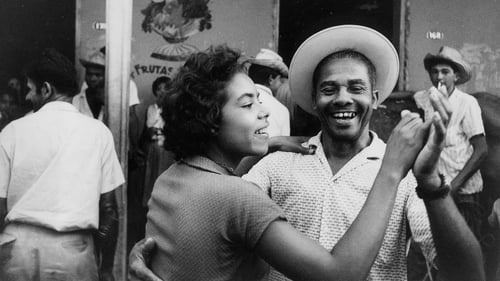Tomás Gutiérrez Alea
Nascimento : 1928-12-11, Havana, Cuba
Morte : 1996-04-16
História
Tomás Gutiérrez Alea was a Cuban film director and screenwriter. He wrote and directed more than twenty features, documentaries, and short films, which are known for his sharp insight into post-Revolutionary Cuba, and possess a delicate balance between dedication to the revolution and criticism of the social, economic, and political conditions of the country.

Interviewee (archival footage)
A look at the life and work of Cuban filmmaker Tomas Gutierrez Alea.

Contemporary film critics regard the epic film I Am Cuba as a modern masterpiece. The 1964 Cuban/Soviet coproduction marked a watershed moment of cultural collaboration between two nations. Yet the film never found a mass audience, languishing for decades until its reintroduction as a "classic" in the 1990s. Vicente Ferraz explores the strange history of this cinematic tour de force, and the deeper meaning for those who participated in its creation.

Documentário sobre a relação do cineasta Glauber Rocha com Cuba.

Writer
Comédia satírica sobre a vida em Cuba. Yoyita, 67 anos, viaja para Guantánamo para ver sua sobrinha Gina e Cândido, um seu namorado de infância. Mas repentinamente Yoyita vai desta para a melhor. Morre. E o corpo precisa ser transladado de volta para Havana. Este fato dá início à grande jornada de Cândido, o ex namorado, e Gina, sua sobrinha, com seu respectivo marido Adolfo, que por acaso é um agente funerário meticuloso com ambições políticas, e assume o comando da viagem. Mas tudo deve ser feito seguindo o novo plano do governo criado para economizar dinheiro no transporte de falecidos. Na viagem Gina reencontra Mariano, um ex aluno apaixonado por ela e agora caminhoneiro, e então... O título do filme é igual ao da famosa canção cubana Guantanamera que significa 'Filha de Guantánamo'.

Director
Comédia satírica sobre a vida em Cuba. Yoyita, 67 anos, viaja para Guantánamo para ver sua sobrinha Gina e Cândido, um seu namorado de infância. Mas repentinamente Yoyita vai desta para a melhor. Morre. E o corpo precisa ser transladado de volta para Havana. Este fato dá início à grande jornada de Cândido, o ex namorado, e Gina, sua sobrinha, com seu respectivo marido Adolfo, que por acaso é um agente funerário meticuloso com ambições políticas, e assume o comando da viagem. Mas tudo deve ser feito seguindo o novo plano do governo criado para economizar dinheiro no transporte de falecidos. Na viagem Gina reencontra Mariano, um ex aluno apaixonado por ela e agora caminhoneiro, e então... O título do filme é igual ao da famosa canção cubana Guantanamera que significa 'Filha de Guantánamo'.

Director
Havana, Cuba, 1979. Flamboyantly gay artist Diego (Jorge Perugorría) attempts to seduce the straight and strait-laced David, an idealistic young communist, and fails dismally. But David conspires to become friends with Diego so he can monitor the artist's subversive life for the state. As Diego and David discuss politics, individuality and personal expression in Castro's Cuba, a genuine friendship develops between the two. But can it last? Strawberry and Chocolate became an instant hit when it was released, and has become a classic of Cuban cinema due to its charming and authentic exploration of a connection between two people under historical circumstances that seem levelled against them.

Director

Director
Susana, a beautiful young girl living in 1990, is happily looking forward to her forthcoming marriage - and has bought an antique mirror to grace her future home. Three weeks before the wedding, the mirror is delivered to her Grandmother's home and taken to Susana's room. Later that day, when looking into the glass, Susana is startled to see the image of a handsome soldier, Nicolas (from 1863), instead of her own reflection. It soon becomes obvious that he can see Susana as clearly as she can see him - and life, for them both, is never quite the same again. Contains three shorts as a trilogy: The Two Way Mirror (El espejo de dos lunas) 1990, 0:29:23 With You from a Distance (Contigo en la distancia) 1991, 0:27:38 Saturday Night Thief (Ladrón de sábado) 1996, 0:24:57

Writer
Matanzas, Cuba, 1913. Two young people who are in love communicate through letters written by penman. When the young man leaves town, to become a pilot, the girl discovers she is really in love with the one who wrote the letters.

Director
Matanzas, Cuba, 1913. Two young people who are in love communicate through letters written by penman. When the young man leaves town, to become a pilot, the girl discovers she is really in love with the one who wrote the letters.

Story
A theater director and script-writer falls for a female worker from the Havana docks, but his machismo, social and working conflicts, and the Cuban woman's condition interfere with their relationship.

Screenplay
A theater director and script-writer falls for a female worker from the Havana docks, but his machismo, social and working conflicts, and the Cuban woman's condition interfere with their relationship.

Director
A theater director and script-writer falls for a female worker from the Havana docks, but his machismo, social and working conflicts, and the Cuban woman's condition interfere with their relationship.

Screenplay
A bourgeois Cuban family of aristocratic origin locks itself into its mansion when the Cuban Revolution comes to power, waiting for the new regime to be overthrown. As time passes, they regress to older and older systems of policital order, from capitalism to feudalism to "primitive savagery."

Director
A bourgeois Cuban family of aristocratic origin locks itself into its mansion when the Cuban Revolution comes to power, waiting for the new regime to be overthrown. As time passes, they regress to older and older systems of policital order, from capitalism to feudalism to "primitive savagery."

Director

Dramaturgy
Quasi documentary about the creation of the Miraflores housing development after the Cuban revolution. In this first Cuban feature film made by an Afro-Cuban and by a woman, Sara Gómez uses innovative documentary and fictional techniques to focus on the marginales in the poorest, most underdeveloped areas of Cuba. Against a backdrop of dismantled slums and new housing construction, the relationship between a mulatta and a Black Cuban unfolds as a conflict between ingrown ideas of race, class and gender and a Revolution that is trying to dismantle the old, outmoded structures.

Screenplay
A pious plantation owner attempts to teach Christianity to 12 of his slaves by inviting them to participate in a reenactment of the Last Supper.

Director
A pious plantation owner attempts to teach Christianity to 12 of his slaves by inviting them to participate in a reenactment of the Last Supper.

Writer
Based on the novel Francisco by Anselmo Suárez y Romero, "The Other Francisco" is a socio-economic analysis of slavery and class struggle through the retelling of the original novel. The film contrasts the romantic conceptions of plantation life found in Suárez Romero's novel with a realistic expose of the actual historical conditions of slavery throughout the Americas. It offers a critical analysis of the novel, showing how the author's social background led to his use of particular dramatic structures to convey his liberal, humanitarian viewpoint.

Director

Director
A close-up examination of laborers creating Cuban cigars intercut with artistic advertising labels and postures for those cigars. Silent with musical accompaniment.

Screenplay
In 1672 Cuban revolutionaries launch an uprising against the Spanish who are occupying the country.

Story
In 1672 Cuban revolutionaries launch an uprising against the Spanish who are occupying the country.

Director
In 1672 Cuban revolutionaries launch an uprising against the Spanish who are occupying the country.

Writer
Em 1962, logo depois da Revolução de Fidel Castro em Cuba, Sergio fica sozinho em Havana, quando sua mulher se divorcia e sai do país, assim como seu melhor amigo. Acaba se casando com uma mulher que não desejava. Mas sua apatia e inação o condenam à solidão.

Director
Em 1962, logo depois da Revolução de Fidel Castro em Cuba, Sergio fica sozinho em Havana, quando sua mulher se divorcia e sai do país, assim como seu melhor amigo. Acaba se casando com uma mulher que não desejava. Mas sua apatia e inação o condenam à solidão.

Story
Um trabalhador exemplar morre em um acidente e é enterrado com a sua carteira de trabalho. Para conseguir o direito de pensão para a sua tia, Juanchín sofre os percalços de uma odisseia provocada pelos absurdos da burocracia.

Director
Um trabalhador exemplar morre em um acidente e é enterrado com a sua carteira de trabalho. Para conseguir o direito de pensão para a sua tia, Juanchín sofre os percalços de uma odisseia provocada pelos absurdos da burocracia.

Writer
A Haitian son returns from fifteen years in Cuba to find his home village afflicted with the double plague of drought and strife. A Cuban production from the director of Memories of Underdevelopment. In Spanish.

Director
A Haitian son returns from fifteen years in Cuba to find his home village afflicted with the double plague of drought and strife. A Cuban production from the director of Memories of Underdevelopment. In Spanish.

Self (uncredited)
A photo montage of Cubans filmed by Agnès Varda during her visit to Cuba in 1963, four years after Fidel Castro came to power. This black & white documentary explores their socialist culture and society while making use of 1500 pictures (out of 4000!) the filmmaker took while on the island.

Screenplay
When her country is taken over by socialist revolutionaries, a wealthy woman can't bear to give up all of her wealth and possessions to the new government, so she hides all of her treasures in the 12 chairs of a dining-room set. After her death her nephew finds out what she had done and, since the chairs had been "nationalized" and are now in the possession of a dozen different people, he sets out to track them down and get the treasures he believes rightfully belong to him.

Director
When her country is taken over by socialist revolutionaries, a wealthy woman can't bear to give up all of her wealth and possessions to the new government, so she hides all of her treasures in the 12 chairs of a dining-room set. After her death her nephew finds out what she had done and, since the chairs had been "nationalized" and are now in the possession of a dozen different people, he sets out to track them down and get the treasures he believes rightfully belong to him.

Editor
Short documentary about Cuba's resistance to American invasion.

Director
Short documentary about Cuba's resistance to American invasion.

Screenplay
Através de três capítulos ("El herido", "Rebeldes", "La batalla de Santa Clara"), conta-se a história de revolta e ascensão contra a o governo do ditador Fulgencio Batista.

Director
Através de três capítulos ("El herido", "Rebeldes", "La batalla de Santa Clara"), conta-se a história de revolta e ascensão contra a o governo do ditador Fulgencio Batista.

Director
In Asamblea general (1960), the documentary about Fidel's address of the First Declaration of Havana in the Plaza of the Revolution, Alea practises what becomes a sustaining Cuban contribution to documentary. Engaging with Free Cinema and cinema-vérité, his camera seems to touch the faces of the new citizen one by one rather than as a single mass before a leader.

Editor
The unfair distribution of land in Cuba encourages the support of the peasants to the revolution.

Story
The unfair distribution of land in Cuba encourages the support of the peasants to the revolution.

Screenplay
The unfair distribution of land in Cuba encourages the support of the peasants to the revolution.

Director
The unfair distribution of land in Cuba encourages the support of the peasants to the revolution.

Director
Documentary that portrays the life of a coal-mining town south of Havana, around 1955, prior to the triumph of the revolution.

Screenplay

Director

Screenplay
A short film based on a story by Franz Kafka. Two men meet to resolve an issue, but are unable to do so due to a series of adverse circumstances.

Director
A short film based on a story by Franz Kafka. Two men meet to resolve an issue, but are unable to do so due to a series of adverse circumstances.

Director

Director






